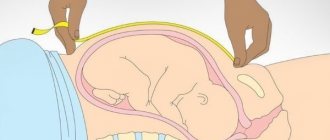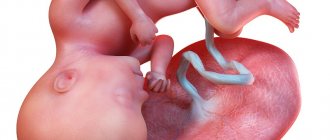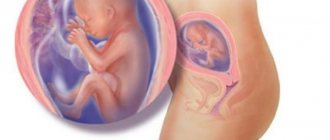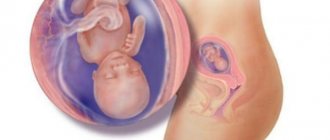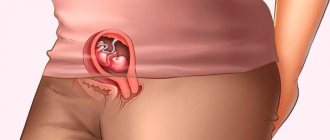The beginning of the eighth month approximately corresponds to the 29th week of pregnancy. During this period, the active development of the fetus and the improvement of all organs and systems of its tiny body continue. The woman already feels her special position in a new way. A significantly larger belly requires lifestyle adjustments. Read about everything that is typical for 29 weeks of pregnancy in the article.
Photo: Karpenko T.N., Serov A.N. Large atlas of human anatomy. - M.: AST, 2020. - 72 p.
Fetal size and development at 29 weeks of gestation
At the twenty-ninth week of pregnancy, the child already has many skills : he not only sucks his thumb, but also scratches his ear, smiles, blinks, and reacts to the voices of his parents.
The fetal muscles become stronger every day, and the strength of movements becomes more active. Which causes some discomfort for the mother, because at 29 weeks of pregnancy she feels not weak movements of the fetus inside the abdomen, but real kicks and blows!
The weight of the child at the 29th week of pregnancy is about 1200 grams, and the height reaches 38 cm.
The baby’s eyes still have difficulty focusing and do not distinguish all colors, but closer to childbirth, vision will be corrected and become clearer. Now your baby is blue-eyed , which may change either at the time of birth or after some time.
The baby’s enamel begins to form on the teeth hidden in the gums. Therefore, it is during this period that it is especially important for mom to eat foods rich in calcium, as well as vitamin supplements.
The nervous system continues to develop actively, and the fetal head no longer seems as disproportionately large in relation to the body as at the beginning of pregnancy.
It is likely that already at 29 weeks the baby can change its position in the uterus , moving its head down to the mother’s pelvis. This is the most correct position in which nothing can interfere with the baby on the way to birth.
However, if the change in position has not yet occurred, or the child has taken a position with his butt down and also across the uterus, there is nothing to worry about. While he still has time to take the desired position on his own.
Often a woman notices rhythmic tremors for 30-40 minutes, which can be nothing more than hiccups in the baby. This is due to the fact that the baby swallows too much amniotic fluid. There is nothing wrong with this, but if hiccups occur too often or last for a very long time, you should consult a doctor.
Twins at 29 weeks of gestation also, in most cases, occupy the position in the uterus in which it will remain until delivery. Babies weigh 1300 grams each, and their body length is about 37 cm. It is not uncommon for one child to be larger than the other. If the difference is insignificant, then it's okay.
However, if there is a noticeable difference between the weight of the twins, the doctor will prescribe special medications that should lead to balance. Children are already learning to breathe on their own, their immune system is beginning to function. Even babies born at this stage have a high chance of being born, albeit weak, but healthy.
Multiple pregnancy
Have you ever seen adorable twins on the street? Have you ever wondered how their mother got such happiness? A multiple pregnancy proceeds somewhat differently than a normal pregnancy. Moreover, the main differences begin in the third trimester; it is the 29th week of pregnancy with twins that becomes the starting point for big changes. Babies begin to grow, quickly gaining weight, and there is practically no room left for activity. Therefore, if one child actively moves during this period, then the twins, on the contrary, calm down a little, although every movement is very noticeable for the mother.
The last trimester is very difficult for an expectant mother. At the 29th week of pregnancy, weight increases by 10-20 kg, constipation, heartburn, shortness of breath, and swelling are very bothersome. I no longer have the strength to move much, although the kids won’t let me lie down quietly. Depending on the mother’s condition, doctors may allow her to have a natural birth or set a date for a cesarean section. You should try to rest as much as possible, because soon you will have a huge number of responsibilities. Two kids will require a lot of attention.
What happens to mom at 29 weeks
belly has become quite impressive and is already causing a lot of inconvenience. On average, by week 29, a woman has gained 5-10 kg from the beginning of pregnancy. If this figure is much higher, the doctor prescribes a special diet. You can see photos of bellies at 29 weeks of pregnancy above.
It becomes more and more difficult for the expectant mother to move, and unpleasant symptoms such as shortness of breath, pain in the limbs, heartburn, and constipation become constant companions in the 3rd trimester.
The pressure of the uterus on the internal organs is felt stronger, and to reduce pain it is necessary to monitor your posture. The straighter the back, the more space there will be for the uterus.
At this time, the woman again begins to be overcome by a constant feeling of fatigue and exhaustion. Lack of sleep due to the child's nocturnal activity, a feeling of anxiety for the baby and fear of the impending birth take their toll.
In the 3rd trimester, a woman should carefully monitor her health, especially vaginal discharge. They are the ones who can alert you to any deviation from the norm.
- Colorless, transparent , odorless discharge may be amniotic fluid, signaling the possible onset of labor.
- Purulent, curdled discharge is a clear sign of a sexually transmitted disease.
- Particularly dangerous are bloody, brownish discharge, which in most cases means placental abruption or premature birth.
A woman may also experience discharge from the breast - colostrum, which is a prototype of the milk that will appear after childbirth.
Your feelings
In the third trimester of pregnancy, many women begin to slowly get tired of their condition. The second trimester has ended, usually it is the most prosperous and easiest of the entire period. Your body is preparing for childbirth, which does not have much time left.
Already become familiar:
- fast fatiguability;
- drowsiness;
- inability to bend over and see your own legs;
- increased appetite;
- increased frequency of urination;
- protruding navel.
Now, many unpleasant sensations can be added to the joy of expecting a child. They are the ones who spoil your mood and can worsen your condition.
During pregnancy, your body produces special hormones that relax your smooth muscles. This is such internal muscle tissue. Relaxation is necessary so that the uterus does not experience tension until birth and is not in excessive tone. But this beneficial property of your body has two side effects.
- Heartburn. There is a small circular muscle between the stomach and esophagus. Normally, it firmly covers the border between these two organs. When this pylorus relaxes, gastric juice may splash out from the stomach into the esophagus. When this happens, you experience heartburn. Porridge and jelly will help you survive this phenomenon. They create an enveloping layer in the stomach and, to some extent, protect the esophagus.
- Constipation. Relaxation of smooth muscles reduces intestinal motility, that is, reduces the number of intestinal contractions. Because of this, feces move slowly and sometimes even accumulate. This is very undesirable - such internal formations prevent the uterus from growing. You should not have stool less than once a day. If a problem arises, prunes, dried apricots and compotes made from them will quickly help. Under no circumstances should you sit on the toilet for a long time and strain, otherwise constipation may be complicated by hemorrhoids.
Other unpleasant sensations include shortness of breath, cramps, swelling and varicose veins in the legs. Read our recommendations for information on how to overcome these conditions more easily.
Sleeping position
You haven't been able to sleep on your stomach for months. In the third trimester, many women get tired of sleeping on their side and want some variety. Unfortunately, you can’t lie on your back now either.
The fact is that in the area between the fourth and fifth lumbar vertebrae, a very large blood vessel begins - the inferior vena cava. It goes right to the heart. When a pregnant woman lies on her back, the enlarged uterus survives the vena cava and greatly impedes blood flow. Some women feel dizzy and faint at the same time. Some people do not experience such symptoms. But regardless of the woman’s feelings, the blood supply to the fetus is also disrupted.
This is why the recommended sleeping position now is on your side. For those with cardiac problems, it is better to lie on your right side. For complete comfort, it is advisable to place pillows under the stomach and between the knees. It’s good if your back also has support while you sleep.
If you can’t lie down comfortably on your side, you can sit half-sitting. Your body should be tilted at an angle of approximately 45 degrees.
Correct sleeping positions
Discharge
Vaginal secretion should be light, transparent, and without an unpleasant odor. Colostrum may be released from the breast. You can't express it. If your clothes get dirty, there are special bra pads, use them or just pieces of bandage folded several times.
You may get thrush on its own. It will be indicated by copious discharge, white and sour-smelling. Yellow, cheesy discharge indicates inflammatory processes in the genitourinary system. If your discharge becomes abnormal, go to the doctor immediately.
At the 29th week of pregnancy, bloody and profuse watery discharge are considered the most dangerous.
Pain
Many expectant mothers often experience leg pain during this period. You just have to walk longer. This is not surprising - after all, the load on the lower limbs has increased. You need to rest your legs more often. You cannot completely give up walking, otherwise problems with blood circulation will arise. It is important to maintain a balance between stress and rest.
You may feel a tugging in your lower abdomen or your entire abdomen at times. In the first case, the ligaments are stretched, so they adapt to the growing uterus. In the second, you probably feel training contractions. From time to time they appear for a few seconds, but quickly pass. An alarm signal is if contractions become more frequent and occur at certain intervals.
Premature birth
The danger of a baby being born prematurely always exists. Childbirth at 29 weeks of pregnancy is undesirable. Modern medical equipment will most likely help the child survive, but still the baby will be weak and not fully developed. Whenever possible, doctors try to stop labor at this stage and allow the mother to carry the baby to term. But if the water has already broken, then there is only one way out - to give birth.
Premature birth can be artificially induced by doctors. This decision can only be made if there is a threat to the life of the mother and/or child. For example, with late toxicosis. Read about this condition here.
Doctor's observations
At week 29, exams and tests are ordered at your doctor's discretion. If your health, weight and blood pressure are normal, all you need to do is stick to the visiting calendar.
Photos of bellies
Tests, examinations and ultrasound at the 29th week of pregnancy
At week 29, when visiting a gynecologist , the woman will be weighed, blood pressure, the position of the uterine fundus will be measured, and abdominal parameters will be measured. Using a phonendoscope, the doctor determines the speed of the baby’s heartbeat, as well as the condition of his organs. The procedure is absolutely safe and is carried out in a maternity hospital or hospital.
The doctor may also prescribe tests for the Rh factor, hormones and sugar. Do not neglect the advice of doctors; all tests are not done in vain and are of great importance in monitoring the development of the child in the womb.
Another procedure that allows you to identify any abnormalities in the fetus is CTG (cardiotocography). It is usually carried out at 31-32 weeks of pregnancy, but at 29 weeks the doctor can refer the woman for a CTG if he has any suspicions of problems in the fetus.
At this stage, an ultrasound will exclude a frozen pregnancy and show the size of the uterus, and the sex of the child will be accurately determined. The expectant mother will be able to see all the baby’s organs and get a picture of the fetus. We invite you to watch a video of an ultrasound of the fetus at 29 weeks of pregnancy, and also look at the photo of the baby above.
Useful tips
Following the advice given by experts will help a woman at 29 weeks of pregnancy improve her overall well-being and mood:
- Don't deny yourself rest.
- If insomnia occurs, before going to bed you need to relax, drink a cup of warm milk or herbal tea.
- There is no need to lie on your back for a long time. The uterus compresses the inferior vena cava, thus disrupting blood circulation.
- If possible, you need to spend more time outdoors. Lack of oxygen can lead to problems in the child's development.
- If a woman notices a decrease in fetal motor activity, she should immediately consult a doctor. With the help of CTG, he will be able to check if everything is okay with the child.
- Now is the time to meet other expectant mothers. Pregnant women always have topics to talk about. Such communication will dispel many fears and doubts and lift your spirits.
- Week 29 is the time when you can make your first purchases for your baby. It is recommended to choose clothes for a height of approximately 60 cm. Do not forget about the bathtub, crib, stroller, bed linen and other household items.
- If premature labor begins, you must immediately lie on your side. Then call the doctor, who will tell you the further plan of action. Most likely, you need to call an ambulance and go to the hospital. Although sometimes contractions quickly subside and labor does not occur.
At week 29, the baby is preparing for birth. The respiratory system completes its development, weight increases, and the fetus takes a position convenient for childbirth. If for any reason premature birth occurs, the baby will already be able to survive.
Video
Possible risks and deviations from the norm
The closer a woman is to giving birth, the more pain she experiences. Pressure of the uterus on the organs, urinary incontinence, pain in the back and collarbone - all this will go away after childbirth.
However, there are ailments that are mistaken for pregnancy. For example, pain when urinating can be caused by an infectious disease, and pain in the perineum, in which the gait becomes a “duck”, is a disease of symphysitis. If there is the slightest deviation, consult a doctor . Right now, the risk of uterine hypertonicity and premature birth is very high. Read more about hypertension here...
Mom's diet and exercises at 30 weeks of pregnancy
Meals at week 29 should be balanced and include all the necessary elements. These include protein foods (eggs, dairy products, chicken), fats, and carbohydrates (cereals, potatoes, cereals).
It is worth excluding from the diet:
- raw meat and fish (meaning oriental cuisine);
- smoked products;
- blue cheeses;
- carbonated and alcoholic drinks.
Of course, due to the greatly increased size of the tummy, the woman can no longer do active physical exercise. However, there is a gentle alternative - stretching exercises . They will help relieve tension from the muscles of the shoulders and back. After all, it is on them that the main pressure comes. Read more about exercises in the 3rd trimester of pregnancy...
Skin care and clothing for pregnant women
Many women are afraid of the appearance of hated stretch marks and actively fight it. The technique of massage with skin stretching has proven effective. It is worth doing it 2 times a day, using a nourishing cream. It is also useful to carry out a contrast shower at least once a day. Walking in the fresh air is very important, because... the skin needs constant enrichment with oxygen.
To maintain their shape, women are advised to wear a supportive bra and maternity bandage. The bandage makes walking easier, relieving some of the stress on the spine and lumbar muscles, and also reduces the pressure of the baby's head on the mother's cervix. You should wear light clothing made from natural fabrics, especially in the hot season.
Sexual relations at 29 weeks
Despite the fact that the woman is already 8 months pregnant and her belly has increased to an unprecedented size, doctors do not prohibit the couple from having sex at 29 weeks of pregnancy.
If the pregnancy proceeds without complications, then making love in a position that is comfortable for the woman will bring pleasure to both partners.
There is no need to be afraid of harming the baby - shallow, smooth movements of the partner will not cause any harm to the fetus, but on the contrary, since the rush of blood to the mother’s pelvis will increase the supply of nutrients and oxygen.
Possible complications
Despite the fact that the 29th week is considered a relatively calm period, at this time it is possible to develop pregnancy complications such as:
- Placental abruption. This dangerous complication can be triggered by injury (fall, blow to the stomach, etc.), as well as exacerbation of chronic diseases and other unfavorable factors. The main symptoms of placental abruption are the appearance of bloody discharge and a “stony” abdomen, with spasms accompanied by pain. Detachment can be complete or partial. In the latter case, with timely provision of medical care, it is possible to maintain the pregnancy.
- Preeclampsia. This is an equally serious complication, in which a triad of symptoms is noted - increased pressure, the appearance of protein in the urine and edema (mainly internal). The severity of symptoms during gestosis may vary. In mild cases, outpatient treatment is carried out; in other cases, hospitalization is required.
- Fetoplacental insufficiency. With the development of this complication, blood circulation is disrupted, as a result of which the fetus suffers from hypoxia. Medical assistance is required to save the child.
- Preeclampsia. This serious condition can result from late gestosis if the woman does not receive medical care. In severe cases of preeclampsia, symptoms such as convulsions, loss of consciousness, coma, and cerebral swelling are observed. Most often, preeclampsia develops if a woman suffers from chronic diseases of the cardiovascular system. Unfortunately, this disease cannot be cured, but it can be kept under control so that the attack that occurs remains the only one. Treatment is usually carried out in a hospital.
- Premature birth. Childbirth at this stage is premature, but it is less dangerous for the baby than before. Babies born at this stage, as a rule, quickly catch up with their peers born on time and develop normally. The main risk factors for a baby born at 29 weeks are insufficiently mature lungs, which makes independent breathing difficult, as well as too small a layer of subcutaneous fat, which reduces the body’s ability to thermoregulate. For a woman, childbirth at this time is exactly the same as childbirth that occurred on time. The greatest risk of developing premature birth at week 29 is among women carrying multiple pregnancies.
So, the 29th week of pregnancy is the period when the mother’s body begins to prepare for the complex process of childbirth. In addition, thanks to the hormone prolactin, colostrum begins to be produced in the breast. This is a highly nutritious product that is a precursor to breast milk. Unfortunately, at this stage of pregnancy, various complications may occur, so the woman needs to carefully monitor her well-being.
Taking cord blood from a baby
Recently, the procedure for collecting umbilical cord blood and storing stem cells . Parents are insured against an unforeseen event when in the future the child may need an organ transplant. Stem cells in the umbilical cord will be 100% suitable for the baby, and may also be suitable for close relatives.
Cord blood is collected immediately after birth or caesarean section. At the moment of cutting the umbilical cord, the doctor inserts a needle into the vein and collects the blood in a special bag. Due to the fact that this process occurs without contact with the mother and child, it is absolutely safe.
The procedure is by no means cheap; initially you will have to pay about 2,000 euros for it, and subsequently, each year of storing blood in an umbilical cord blood bank will cost 3,000 rubles.
When choosing a cord blood bank, you should approach it very carefully, paying attention to the following points:
- The bank must have a license from Roszdravnadzor. Without it, he does not have the right to carry out any activity.
- The bank must have all the necessary conditions for storing blood. Don’t bother reading detailed information not only on Russian, but also on foreign Internet resources.
Recommendations for the expectant mother
- Since in the 3rd trimester a woman often faces a problem such as constant overheating (associated with increased metabolism), she should give preference to light, multi-layered clothing made from natural fabrics.
- You can reduce swelling by limiting yourself to eating salty and sweet foods and drinking too much water. Doctors advise eating as many fruits and vegetables as possible, and also regularly resting by lying on your side for 15-20 minutes.
- To avoid heartburn, you should eat small portions, but often. You can't overeat at night.
Pregnancy 29 weeks - what needs to be done?
- Try to eat more fruits and vegetables. Avoid exotic fruits, they can lead to upset.
- Keep wearing the brace. Now you will need a support bra.
- Watch what you wear. Haven't you gone through your wardrobe yet for suitable items? Remember that nothing from clothing should rub or restrict movement, even shoes.
- Wash yourself often with warm water, this is an excellent prevention of hemorrhoids. If it starts, then do not use self-prescribed remedies; only a doctor can select them for you.
- If slight swelling appears, take a contrast shower.
- Is the gender of the baby known? Take your husband by the hand and go buy the first things for your daughter or son. The future grandmother will be very happy with such an outing.
- Talk to your baby more often, ask your husband about it. Sing him songs and even introduce him to music.
- Does anyone in the family want to communicate with the baby through the tummy wall? Let him. This helps the baby remember voices, and after birth he will not be afraid of them.
- Don't get overly emotional. Even the most joyful emotions are not very useful. And stress and fear are generally harmful to a child.
- Daily walks are very beneficial. When it’s winter outside, try to walk during the warmest hour. Comfortable shoes and clothing will make the walking process easier.
- Avoid places where there are large crowds of people in a small space. There is a risk of catching a cold. Need to go somewhere and can't avoid the crowds? Then take a mask with you. In the hot weather, intestinal infections are dangerous, so wash your hands and all fruits and vegetables more often.
- Kegel exercises are an excellent practice before childbirth and later in your sexual life. They are great for helping to strengthen muscles for those who leak urine when sneezing, coughing or exerting themselves.
- Try to accumulate a lot of positive and bright emotions, this will save you from postpartum depression. Books, movies, and favorite activities will help improve your mood.
Video about 29 weeks of pregnancy
We invite you to watch the next episode of the video guide on the 29th week of pregnancy, where future parents continue diagnosing the child using CHT, and are also thinking about collecting cord blood and storing stem cells. We think that this video will be useful to you.
Soon a woman will become a mother and the excitement associated with this reaches its limit. It is very important to tune in to a positive outcome and try to be in harmony with yourself, which is very important for the baby’s condition. If this is your first child, do not be afraid to ask advice from the older generation of the family or friends who have already given birth. And also share your experience and interesting tips with other expectant mothers!
Weight gain
Russian gynecologists are confident that during pregnancy a woman should gain no more than 12 kg, while their Australian colleagues, for example, believe that the maximum gain is 18. This once again proves that the weight gained while expecting a baby may have deviations from the norm. The “adequacy” of these deviations is determined by the doctor. Nevertheless, there are approximate figures. The total weight gain by the end of the 29th week, according to domestic experts, for women of normal build is about 9 kg.


